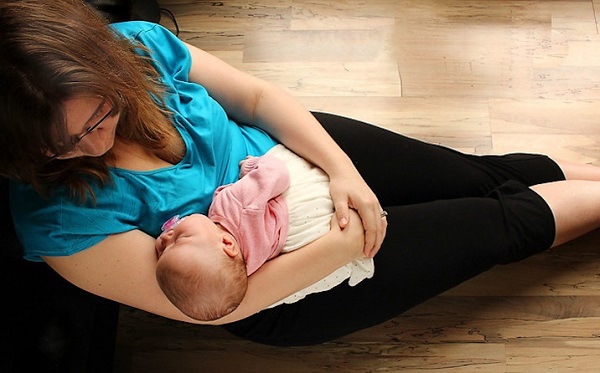
There’s hope for postpartum depression with new drug from Magee-Womens Hospital
Photo by JessicaPankratz / Flickr.
This story first appeared in NEXTpittsburgh, the go-to publication about the people advancing Pittsburgh and the innovative and cool things happening in the region. See more stories here and sign up to get their newsletters.
Women who struggle with postpartum depression know how frightening and frustrating their feelings can be — and sometimes typical therapies don’t alleviate the problem.
About 1 in 7 new mothers experiences symptoms of postpartum depression, according to the Centers for Disease Control and Prevention (CDC). The CDC recommends that doctors screen patients for this complication of pregnancy.
Psychotherapy or medication, or a combination of the two, can be helpful in treating perinatal depression in many women but not all. Now, women in Pittsburgh whose symptoms aren’t subsiding with other therapies may get relief from a new drug called brexanolone. Designed specifically for the treatment of postpartum depression, the drug was approved by the U.S. Food and Drug Administration in March 2019.
UPMC Magee-Womens Hospital is the first hospital in Pittsburgh to offer the drug and will provide the treatment in collaboration with UPMC Western Psychiatric Hospital. The drug is fast-acting, administered intravenously over a 60-hour period, so patients are hospitalized during treatment.
Dr. Priya Gopalan, medical director of psychiatry services for Western Psych and Magee, says it’s an exciting option.
“For women who have acute symptoms, it’s crucial to intervene quickly and this medication has a rapid onset, with most patients reporting effects within 24 hours after completing the infusion,” says Gopalan. “This will not be the first line of treatment for moms with mild to moderate postpartum depression, because options like psychotherapy and antidepressants have proven to be effective in those cases.”
A psychiatrist with Western Psych’s outpatient perinatal psychiatry program will determine if a woman is a candidate for this therapy, based on the severity of her depression and her response to other treatments. Those who qualify to receive the drug will be treated at Magee under the supervision of a psychiatrist and a maternal-fetal medicine specialist.
After treatment, patients will follow up with their established mental health team or can get a referral to a UPMC Western Behavioral Health postpartum mental health program.
Few drugs are designed specifically for pregnant and postpartum women, says Dr. Hyagriv Simhan, executive vice chair of obstetrical services at Magee.
“This patient population often is excluded from clinical trials and research because of the possible risks for the developing fetus,” he says. “However, it’s important to include moms in research so that their needs — along with the needs of their baby — are appropriately addressed. … Offering this unique drug, designed specifically for postpartum women, is certainly a step in the right direction.”
Brexanolone treatment will be covered by UPMC Health Plan when indicated by the insurer’s clinical guidelines and requested by a patient’s physician, says Dr. James Schuster, associate chief medical officer and senior vice president of medical and behavioral services at UPMC Health Plan.
“Postpartum depression is a serious and sometimes difficult-to-treat disorder,” he says. “UPMC Health Plan recognizes that this medication is an important new treatment option for our members.”
In central Pennsylvania, UPMC Pinnacle Harrisburg will offer brexanolone treatment as well.
According to the National Institutes of Health, the drug is an analog of the human hormone allopregnanolone, a naturally produced steroid that acts on the brain.
In clinical trials, brexanolone was generally well tolerated; the most common side effects were dizziness, drowsiness, dry mouth, hot flushes and, in some cases, loss of consciousness. The research showed that brexanolone transfers to breast milk, but the relative infant exposure to the drug is considered low.